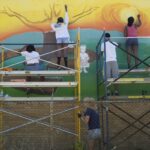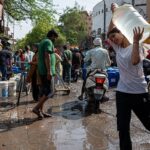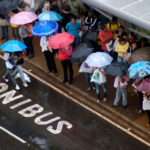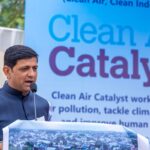Posts tagged with 'public health'
Since President Joe Biden launched the Justice40 Initiative in January 2021, over $600 billion has been designated for more than 500 programs across 19 federal agencies. This funding supports climate-related infrastructure initiatives with a commitment to ensuring 40% of the benefits reach ...

The world recently experienced a 13-month streak of record-breaking global temperatures. And as blistering heat waves punish communities across several continents, 2024 is on track to be the hottest year on record. Global average temperatures are now perilously close to exceeding 1.5 ...

On July 22, the world experienced its hottest day in recorded history. The global average temperature reached 17.2 degrees C (62.9 degrees F), prompting UN Secretary-General António Guterres to issue a global call to action on extreme heat. The problem of extreme ...

Getting more zero-emission trucks on the road is an important transportation shift that is needed to reduce air pollution, protect public health and curb climate-harming emissions. But transforming the entire trucking industry is a challenging feat that will require the ...

Daily commutes via car have evolved into more than mere trips – they greatly influence both our mental and physical well-being. Research shows that relentless car journeys don’t just occupy our time, they significantly shape our mood and overall outlook ...

The Kham River in India, which flows through the city of Chhatrapati Sambhajinagar (formerly known as Aurangabad), fluctuates from a torrent during monsoon season to barely a trickle during dry months. Years ago, the Kham provided drinking water to the ...

Every three years, ICLEI hosts the ICLEI World Congress to showcase how subnational actors advance sustainable urban development worldwide. The most recent installment, ICLEI World Congress 2024, held June 18-21 in São Paulo, Brazil, converged over 1,500 global attendees to ...

Mexico became the first nation to declare access to safe mobility a human right in 2020 and two years later passed the General Law of Mobility and Road Safety to protect people, reduce collisions and promote sustainable modes of travel. Now, with this new ...

By early 2025, countries are due to unveil new national climate commitments under the Paris Agreement, known as nationally determined contributions (NDCs). These commitments form the foundation of international climate action, establishing emissions-reduction targets and other measures that countries promise ...

Like many parts of Africa, motorcycles are the most popular form of transportation among Rwanda’s 13.3 million people. Whether they’re commuting to work or school, transporting jugs of water from the local taps or just running everyday errands, people on ...

The adoption of any new technology involves some degree of adaptation, and battery electric buses (e-buses) are no exception. After decades of experience with diesel vehicles, cities and operators need to understand the technical and operational specifications of e-buses to ...

In Africa, as elsewhere, advances in computing power, data storage, and sensor and satellite technologies have unleashed unprecedented opportunities but also challenges. The mobile phone has become a powerful tool for generating vast amounts of data. This data can, in ...

Indore is known as India’s cleanest city, having secured the title seven years in a row in Swachh Bharat National Cleanliness Surveys, and it is now determined to clean its air too. On February 15, the “Clean Air, Clean Indore” ...

Transportation connects us to one another. It’s how we get to school and work, how we visit our families, and how we access our food and health care. It’s also how we ship goods and deliver services. As economies and ...

When India’s federal government announced a public health lockdown on March 24, 2022 in response to the COVID-19 pandemic, it generated desperate scenes. Economic activity ground to a halt. Millions of migrant workers traveled back to their home states. In ...

Page 2 of 10123...10...Last »

























